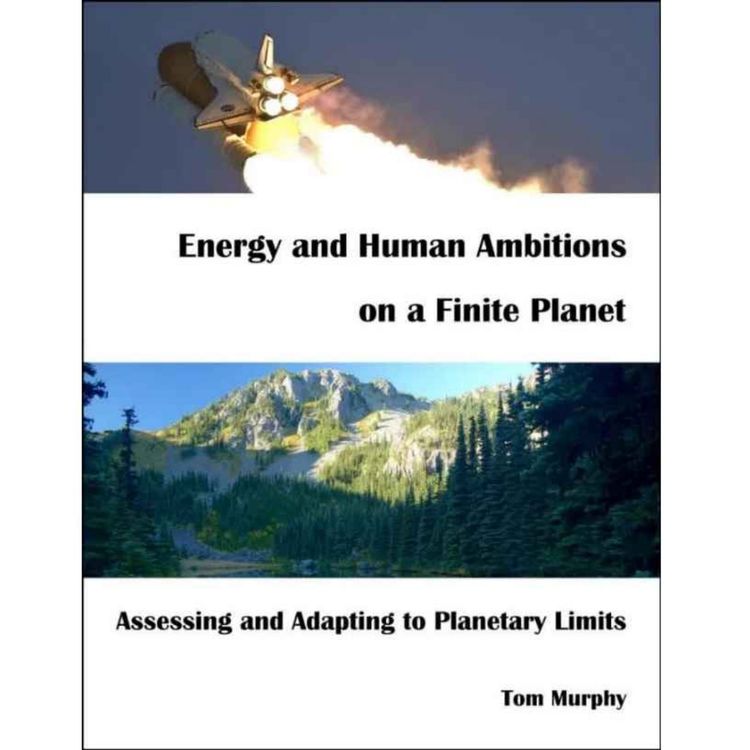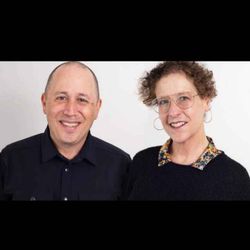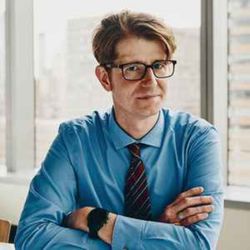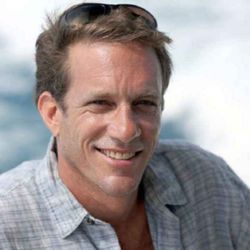Share

This Sustainable Life
469: The Science Book of the Decade: Energy and Human Ambitions on a Finite Planet, by Tom Murphy
I didn’t think of how small my building’s elevators were when I bought a sofa after moving into my current apartment. It didn’t fit. The deliverymen tried to bring it up the stairs too. They made the first landing, but couldn’t make the turn to go up the next flight.
They had to take it back. I ended up paying a $300 restocking fee plus big tips for the deliverymen’s extra efforts. Plus I lost weeks with no sofa. Now I know my home’s limits. Living within them is no problem when I know them, only when I didn’t. A few minutes of measurement and geometry could have saved me that trouble and improved my life.
Can homo sapiens’ elevator, also known as Earth, fit us all in? As with my sofa, maybe a bit of calculation is worth saving the trouble of finding out if our sofa can fit. We’re past the point of eyeballing it. Our sofa is civilization and billions of lives.
I doubt even those who study sustainability most can answer Important questions like
- Can fusion save us? Will it?
- What works between solar, wind, nuclear, geothermal, and other options? What doesn’t? Why not?
- What unintended side-effects are we missing?
- Do we risk losing civilization? If so, how great is the risk?
- If we take the gloves off, can geoengineering and other last-ditch efforts work?
- How hard will saving it be?
- What do we have to do to make it?
These questions have answers, whether we find them out or not. There are a lot of books on the environment. I’ve read a lot of them. Most just describe our situation and what will happen if we don’t fix it. Some talk about what we can do, but they don’t help us understand. They don’t describe the patterns, just the results or instruction. We have to trust the writer.
We’ve all heard to eat less meat. How much less? Will all the things they tell us to do solve the problems? How can I tell? What if I don’t eat less meat? Between eating meat or not, why can’t I see any difference in the world? Should I bother trying or just enjoy life to the max?
We’re just told the problems and what to do. Maybe school should have taught us but it didn’t. After decades of poor science education, few teachers know how to teach science. They spout facts and instruction. Most analysis and activism is done without context or knowing nature’s patterns, based on feelings. Some envision a world of 10 billion thriving, others a collapse well before.
Sustainability leadership is my life passion and frankly I don’t find most resources on the environment useful or readable. From the IPCC report Greta Thunberg gave to Congress to An Inconvenient Truth to articles suggesting “one little thing you can do for the environment,” they describe results and tell us what to do. They don’t help us understand beyond “coral reefs are bleaching” and oversimplifications like “CO2 acts like a blanket.” We have to take their word things like biodiversity is good and pollution is bad.
Even knowing all the data doesn’t tell us the patterns. Will buying an electric vehicle matter? Does flying matter? How much? Enough to save lives? How can I tell, or do I have to take your word for it? Most of all, what about when they clash with other values? What if someone else says jobs or energy security is more important? Is there conflict? If so, how do we resolve it? What if we don’t want to emit greenhouse gases but our mother is sick, flying distance away? Or we feel our job depends on it? What about someone else saying the economy depends on my buying more stuff?
Only knowing data but not patterns, we can’t think or decide for ourselves. We throw up our hands. For generations we’ve said we’d act and in fact we have, yet we keep lowering Earth’s capacity to sustain life and society. Could our ignorance be causing our attempts at solutions to augment the problems? Might our current attempts at solutions be exacerbating the problems. Are we on a road to hell paved with good intentions?
Tom Murphy’s new book, Energy and Human Ambitions on a Finite Planet, changes all that. It empowers us to understand, think, and act for ourselves.
Murphy earned his PhD at Caltech and teaches at UC San Diego. A decade ago he started the Do The Math blog, where he did more than answer the questions above. He showed how he found the answer so you can too, so you can think for yourself. I called it the best site on the internet (tied with Low Tech Magazine).
Murphy’s sofa-doesn’t-fit-in-the-elevator moment came in 2006, shortly after moving to San Diego, considering the value of his home. He wrote:
He sold at the height of the market. On seeing the success of applying quantitative analysis over hand-wavy platitude-based opinion to life, instead of moving to finance like many physicists, he applied it to the environment. He saw hand-wavy platitude-based beliefs and couldn’t stand it. He began applying physics to how we create energy, population, and so on in Do the Math.
To the chagrin of his dedicated audience, since 2015, he posted only once. He told me on one of his appearances on my podcast that he had answered the most important questions so didn’t have more to write.
But he wasn’t done. The blog was an unorganized string of posts. He taught a course to non-science undergraduates on the subject, called Energy and the Environment. He used the course to compile his posts, polish them, and make a self-contained comprehensive book. As far as I know, the only one like it, possibly because mathematics is the language of nature, so equations abound, but he explains them, so people who haven’t taken science or math classes since high school can follow.
Showing the math means we don’t have to take his word for it. We can do the math too and think, judge, and act for ourselves. No matter our politics, age, industry, etc, we can access this book equally. The environment involves many branches of science, including physics, astronomy, chemistry, biology, systems, and more, as well as fields including engineering, history, politics, philosophy, and more. Murphy brings them together like no other resource I’ve found. Many will shy away from devoting the time that the gravity of our environmental situation demands, but for enabling and empowering every reader to understand, think, judge, and act for themselves, I consider Energy and Human Ambitions on a Finite Planet the science book of the decade.
I’ve read and watched a lot of books, videos, and articles. For reference, I consider Sustainability Without the Hot Air by Caltech-trained Cambridge physicist David MacKay the science book of the previous decade, and Limits to Growth: The 30-Year Update, the science book of the decade before that, by Donella Meadows, Dennis Meadows, and Jørgen Randers. (A video of David MacKay after his book led me to avoid flying, not as a burden but to increase my enjoyment of nature and connection to humans.) Read these three books, and you understand our environment.
But wait, there’s more. Murphy has acted on his findings in his personal life. He didn’t just use an electric car or unplug appliances before doing so was cool, he measured his results and shared how doing so affected his relationships with his wife, peers, and students. He shares his life and profession. This book doesn’t teach raw information, it shares a lifestyle.
I’m not saying the book is easy, only that I find it the most valuable book or resource on the most important area humans have faced as a species, and I’ve read and watched many.
Murphy’s book is glorious. He writes about the wonder of nature, our genius in harnessing it, its limitations, and our folly at not measuring the sofa before trying to jam it into the elevator, or believing the self-serving interests suggesting a “new normal” without justification.
The math is accessible to a non-science undergraduate. To someone with a PhD in physics like me, it is a symphony—pure joy when you understand it, even more when your study it. Beethoven didn’t write his Ninth for one hearing. Yo-Yo Ma has to study pieces and even with my PhD, I have to take time to understand its equations and application. I learn each time I read Murphy. You will too. The payoff is worth it for aesthetic pleasure alone. There are practical benefits to understanding the patterns: unlike Beethoven, the fates of civilization and millions of species, including our own, depend on our understanding and behavior.
Learning math and physics here is like learning biology and chemistry when you start gardening or sports. You don’t need to start with anything. You won’t reach your potential, but you won’t get injured either. You’ll learn by doing. Any gardener will soon learn about species and seasons. Lifting weights taught me anatomy and diet. Sailing will teach you tides and fluid dynamics.
Humans have values. What we consider good, bad, right, and wrong stands outside math and science. Euclid derived all of Euclidean geometry from five axioms but he had to start with them. Likewise, math lets you get from your values to what to do but it doesn’t tell you your values.
Engineers often think math tells you answers. They promote nuclear power for not emitting CO2 or electric vehicles because they are more efficient, but do our deepest values include avoiding CO2 emissions and efficiency?
Murphy describes how nuclear fission and fusion work, their hurdles to implementation, and so on, but then treats the science and technology as only the starting point to decide their value. Most analyses and people confronted with waste and pollution see more efficient sources and less polluting sources as the solution. Obviously, they pollute less, right? Not so fast. You have to do the math. What patterns have we followed before? If we follow them again, what will happen? People familiar with systems may expect systems to behave differently than their elements alone. Murphy does the math and suggests clean fission and fusion would compound our problems. Don’t believe him? You can do the math yourself, but if you just feel confident based on hopes, dreams, and fantasies, you’ll benefit most from his book.
Most science books tell you results of experiment or predict some outcome based on some model. The IPCC reports, for example, tell you our best understanding of our climate measurements and where, given our patterns, we’ll end up or could end up if we change our behavior. The results show lots of numbers. They do math but they don’t enable you to do math. Books like the Uninhabitable Earth describe such predictions in prose, again not enabling you to do math.
After generations of this nation denigrating science, math, nature, and education of them, I’m under no preconceptions of how popular this book will become. People feel guilty thinking and talking about the environment when their responsibility comes into play. Still, everyone can understand it. You’ll love it when you work through it.
Every policymaker, CEO, and media programmer will benefit their audiences from knowing this book. Even if leaders don’t read it enough to understand it, this book enables them to have on staff or retainer someone who understands the math from doing it. That leader can choose not to talk in equations. He or she may even wave his or her hands and speak in platitudes, but can start from understanding, not ignorance.
I wrote how mathematics is the language of nature and that Murphy’s book is a symphony. The video below of a master class will illustrate what I mean (and put a big smile on your face, there are more of his videos here). Ben Zander is a conductor, musical director of the Boston Philharmonic Orchestra, and bestselling author. He speaks sometimes in English but other times through the piano. Because music is the language of music. Zander can’t communicate in English the sound and meaning of music where a few notes on the piano communicate everything.
As music communicates music, equations describe nature. I know people more fluent in music will hear more than I do from Zander, but I love what I hear and value hearing what I can. You will gain as much reading Energy and Human Ambitions on a Finite Planet.
Here is a video Tom and some peers made of the book:
https://youtu.be/2fbOWhJy7SoMore episodes
View all episodes

846. 846: Gail Eisnitz: The Inside Story of a Life Investigating Factory Farms
01:00:13||Ep. 846Gail shares her investigations into meat industry practices, exploring how exorbitant slaughterhouse production line speeds in a consolidated slaughter industry affect animals as they are being handled and killed, and how the proliferation of massive factory farms impacts animals being raised in intensive confinement.She spent decades in the field documenting violations against farm animals and in the office preparing cases and writing about her investigations in articles and books. Her efforts to expose and prosecute animal abusers were often thwarted by network television producers and by law enforcement authorities. Producers considered her findings too disturbing. The law refused to prosecute abusers. Instead they provided cover for the meat industry---a billion-dollar industry.She gives an inside view behind the closed doors of U.S. slaughterhouses and factory farms. She also shared her challenges and successes in documenting and exposing the findings.As a memoir, Out of Sight has been described by reviewers as a “detective story” and a “page turner” that they “can’t put down," probably for her personal challenges related to her diagnosis with a rare medical visual condition she shares in our conversation.Gail's web pageThe Humane Farming AssociationHer most recent book: Out of Sight An Undercover Investigator's Fight for Animal Rights and Her Own SurvivalHer first book: Slaughterhouse The Shocking Story of Greed, Neglect, and Inhumane Treatment Inside the U.S. Meat Industry
845. 845: Sarah Goodyear and Doug Gordon: The War on Cars and Life After Cars
01:26:50||Ep. 845Doug and Sarah's podcastThe War on Cars is a podcast that delivers news and commentary on the latest developments in the worldwide fight to undo a century’s worth of damage wrought by the automobile, approaching the topic from all angles, from politics to pop culture. They release two regular episodes and one Patreon bonus episode per month.Doug and Sarah's BookCars ruin everything. That’s why we need Life After Cars.When the very first cars rolled off production lines, they were a technological marvel, predicted to make life easier and better for everyone; yet a hundred years later, that dream is running on empty.Instead of unbounded freedom, the never-ending proliferation of automobiles has delivered a host of costs, among them the demolition of our neighborhoods, towns, and cities to make way for car infrastructure; an epidemic of violent death; countless hours lost in traffic; isolation from our fellow human beings; and the ongoing destruction of the natural world.That’s why we need Life After Cars. Through historical records, revealing interviews, and unflinching statistics, Sarah Goodyear and Doug Gordon, hosts of the podcast The War on Cars, and former host Aaron Naparstek unpack the scale of damage that cars cause, the forces that have created our current crisis and are invested in perpetuating it, and the way that the fight for better transportation is deeply linked to the fight for a more equitable and just society.Life After Cars expands on the podcast with new interviews and original content—offering something for everyone, from longtime listeners familiar with the harms of car culture to those just beginning to imagine a world with fewer metal boxes zooming around.Cars as we know them today are unsustainable—but there is hope. Life After Cars will arm readers with the tools they need to implement real, transformative change, from simply raising awareness to taking a stand at public forums.It’s past time to radically rethink—and shrink—society’s collective relationship with the automobile.The podcast: The War on CarsThe book: Life After Cars
844. 844: Maya Lilly, part 1: Effective Storytelling and Producing The Years Project
01:35:59||Ep. 844Since I've seen Maya's work on the Years Project with people like executive producers James Cameron and Arnold Schwarzenegger, I was worried I might feel starstruck.Oh wait, she also worked with series creators Joel Bach and David Gelber (of 60 Minutes); chief science advisors podcast guest Joseph Romm and Heidi Cullen; and episode hosts including Cameron, Schwarzenegger, Harrison Ford, Ian Somerhalder, America Ferrera, David Letterman, Gisele Bündchen, Jack Black, Matt Damon, Jessica Alba, Sigourney Weaver.Oh, and the series won an Emmy for Outstanding Documentary or Nonfiction Series.She was engaging, informative, open, and fun. We laughed a bunch We talked about her passion for the art and practice of storytelling. You have to be true to the science, but you can't skimp on the story or take for granted it will work. We also talked about her background that brought her to this level.The Years ProjectIts YouTube pageMaya's curated climate listUPDATE: After we recorded, Maya noted that about halfway in, she said "Bread and Puppet theatre in San Francisco." The actual troop was The San Francisco Mime Troupe.
843. 843: Judith Enck, part 2: The Problem with Plastic (the Book)
28:43||Ep. 843Judith just published The Problem with Plastic: How We Can Save Ourselves and Our Planet Before It’s Too Late.I've read a lot about plastic and hosted many authors. I won't lie. Before starting the book, I thought I should read it because I knew her, but didn't expect much.Instead, I learned a lot new. I found it engaging and compelling. I recommend it.Yes, you'll learn things that are sobering, but you'd rather know than not know, especially things that affect your health and safety and your family's. It also guides you to how to respond, personally, socially, and politically. Judith cares and has experience.Start by listening to our conversation. Then read the book.The Problem with Plastic: How We Can Save Ourselves and Our Planet Before It’s Too LateWEBINAR with co-authors Judith Enck, Adam Mahoney, and Melissa Valliant, January 28, 2026
842. 842: Silvia Bellezza, part 1.5 and 2: When at first you don't succeed
39:44||Ep. 842Since Silvia teaches as a business school, I'll address a leadership aspect of our interaction. I skimped on a leadership step, so we did an episode 1.5, which is my lingo for redoing episode 1 when the person wasn't able to fulfill his or her commitment. That's my responsibility as leader of the interaction.Silvia and I had a wonderful first conversation that led to a commitment that sounded like she'd enjoy it and doable, but in the end wasn't quite. Even if a quick hike north of the city would be enjoyable, catching a Metro-North train from Columbia University isn't that convenient and her schedule may not have bee as flexible as she suspected in our first conversation.For those listening to these conversations to learn the Spodek Method, in our first conversation I didn't check with her how practical the commitment was given her constraints. As the leader of the interaction, I should have asked ahead to imagine her schedule, the logistics of catching the train, and so on. The key measure the first time someone acts on their intrinsic motivation isn't how big it is. It's if they person does it.When someone acts on intrinsic motivation, they'll find it rewarding. If they feel reward, they'll want to do it again and the next time will be bigger, especially if they've always considered acting on sustainability a sacrifice or something that has to be big or any of the other myths people propagate. Sadly, even ardent environmentalists lead people to think of acting more sustainably as something they won't like or won't find rewarding when they use tactics like trying to convince, cajole, coerce, or seek compliance.In this double episode we hear how she did something more practical. At the end, note that she's open to doing more.
841. 841: Sandra Goldmark, part 1: Fixation: How to Have Stuff without Breaking the Planet
41:57||Ep. 841How often does something break that you know could be fixed, but you don't know how and there are no places to fix it? I remember repair stores all over the place, but the field doesn't exist any more. We all know about planned obsolescence and how products are designed to break. Now we feel we have to throw things away and replace them (after avoiding buying things when possible, which is far more than most of us practice).Enter Sandra Goldmark, as a member of a growing movement to fix things and make things fixable. She's also an Ivy League professor at Barnard and the Columbia Climate School, so, no, professors don't have to be out of touch.I met Sandra before the pandemic, at a shop she set up down by the South Street Seaport to repair things. Besides her own book Fixation, she was mentioned in a book (The Repair Revolution) in my sustainability leadership workshop alumni book club.Lest you think people have to be born fixers or educated as engineers, a preconception that I find still holds me back, she shares her background not growing up with those things. On the contrary, she found she enjoyed it and found community.Listen for a basic human approach to fixing things and changing culture.Sandra's home pageHer book, FixationHer page at Barnard
840. 840: Dr. Leonardo Trasande, part 1: Sicker, Fatter, Poorer: The Urgent Threat of Hormone-Disrupting Chemicals to Our Health and Future ... and What We Can Do About It
01:10:11||Ep. 840I found Dr. Trasande quoted in a Washington Post article The health risks from plastics almost nobody knows about: Phthalates, chemicals found in plastics, are linked to an array of problems, especially in pregnancy. He said, "Endocrine-disrupting chemicals are one of the biggest global health threats of our time ... And 2 percent of us know about it---but 99 percent of us are affected by it.”The article said that he said that "at the population level, scientists can see telltale signs that those chemicals are undermining human health, adding to growing male infertility or growing cases of ADHD." This outcome suggests a violation of this nation being founded on protecting life, liberty, and property, and the consent of the governed. I also found from this video, Food Contaminants and Additives, that he reported his results thoroughly, taking care not to venture outside his research.I had to talk to him.We talked about his research, what brought him to a new field, now burgeoning, of learning about chemicals that disrupt our endocrine systems---that is, they mess with our hormones. You'll hear that he didn't intend to go into it. It was (tragically) growing in importance since our hormone systems are becoming increasingly disrupted, as are those of many species.I should be more accurate. They aren't passively being disrupted. Consumers are paying companies to produce chemicals that do it.It sounds slimy and scary. I'd rather it didn't happen, but since it does, I'd rather know than not know. I think you would too.Dr. Trasande's NYU faculty page
839. 839: Saabira Chaudhuri: Consumed: Throwaway Plastic Has Corrupted Us
48:34||Ep. 839Reading Saabira's New York Times piece Throwaway Plastic Has Corrupted Us told me she saw more about plastic and its effect on our culture than most. A quote from it: "The social costs of our addiction to disposable plastics are more subtle but significant. Cooking skills have declined. Sit-down family meals are less common. Fast fashion, enabled by synthetic plastic fibers, is encouraging compulsive consumption and waste."Her tenure at the Wall Street Journal told me she would communicate it effectively, pulling no punches. As much as I prefer not to link to social media, this video review by Chris van Tulleken, bestselling author of Ultra-Processed People, is about as positive a review as I've seen, all the more since he clarifies that he doesn't know her.So I invited her to talk about her book Consumed: How Big Brands Got Us Hooked on Plastic. It launches today (October 7) in the US, so I've only finished the beginning, but it delivers. In our conversation, she describes what to expect when you read it, plus her back story driving her to write it.Many reviews describe her humor. You'll hear that I held back from asking her about how she worked humor into the topic, since she's not a comedian so I wouldn't expect to perform unprepared, but no worry, she made me laugh unprompted and shared more humor from the book. Obviously it's a serious topic, and Saabira's work shows how much more serious than you probably thought, but being depressed doesn't help solve it.Saabira's home pageHer New York Times piece that brought me to her: Throwaway Plastic Has Corrupted UsHer book page for ConsumedThe video review we mention by Chris van Tulleken, bestselling author of Ultra-Processed People
838. 838: Zach Rabinor, part 2: What if your business and values clash?
01:01:27||Ep. 838Zach and I got so into our first conversation that we had to take a second one to get to the Spodek Method.Listen for yourself, but I hear Zach working with three motivations:His surfer, outdoors self wants to conserve, protect, and enjoy nature and enable others to do the same by experiencing it.His CEO self wants to deliver what his customers want, despite what they want including polluting and depleting---that is, hurting people and wildlife---beyond what nearly anyone who ever lived has. They don't know it and his company's current message implies that they're helping, not hurting.His leadership self wants to improve himself and his work, to resolve conflict, to explore his boundaries and his team's to see if they can change the world.This situation exists in nearly everyone I know: we love humanity and nature, we live in a culture that rewards the destruction of each, and we want to help resolve that conflict. The difference with Zach is not that the stakes are higher. It's that he is willing to share this internal conflict publicly, not to hide it or act like it isn't there. Only by examining one's blind spots and vulnerabilities can one grow in the areas we care about most. Zach is out on the forefront.